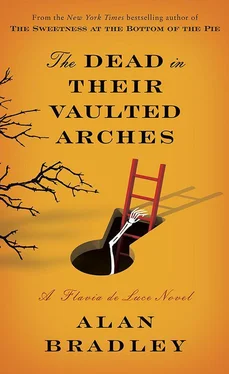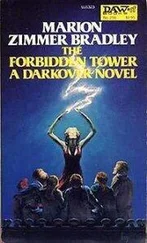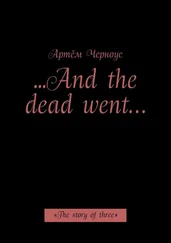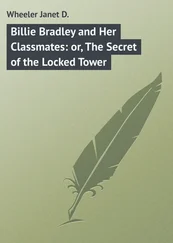With Inspector Hewitt and his men of the Hinley Constabulary and Adam Tradescant Sowerby (Inquiries) on the case, I knew instinctively to keep certain information to myself.
That I had let slip the fact that Mr. Churchill had spoken to me was troubling. I would need to be far more discreet in future.
I was trying to think of a way to remove myself from this dangerous conversation when someone laid a large hand on my shoulder.
It was the vicar, Denwyn Richardson, and behind him stood his wife, Cynthia.
“Dearest Flavia,” he said. “We’ve been looking for you everywhere. I’ve spoken to your father, of course, but—I told him we were sorry not to have traveled with you to Buckshaw from the station yesterday, but what with poor Mrs. Dainty being taken so suddenly, and everything being consequently at sixes and sevens, to say nothing of the fact that our telephone at the rectory chose that moment to—well, how very, very sorry we are that things have come to such a—”
Cynthia brushed past him and wrapped me in such a tight and quaking hug that I thought my bones would surely shatter.
We had had our battles, Cynthia and I, and it was only recently that I had learned of the tragic death, seven years ago Christmas, of their daughter, Hannah.
Hannah had been four years old, my exact age at the time, when she fell beneath the wheels of a train at Doddingsley station. She had been laid to rest in a so-far unmarked grave in the churchyard of St. Tancred’s, and the villagers had begun a conspiracy of silence to shield the Richardsons from grief and guilt. The little girl had darted away from her father on that tragic long-ago Christmas, and he had blamed himself.
The trembling of Cynthia’s embrace became a chill as I realized what a harsh reminder the death of Terence Tardiman must be to them: that whole ghastly nightmare on the railway platform brought back to life and shoved in their faces, as it were.
I felt my tears coming, and before I could stop them, they were dribbling down Cynthia’s neck. Rather than pulling away, though, she was now hugging me all the harder.
How sorry I suddenly felt for this poor little woman: this poor unfortunate little creature upon whom I had wasted so much hatred over the years. What kind of life did she have, when you stop to think about it? All of her days and nights were given over to visiting the sick, arranging flowers for the church, chairing meetings of this committee and that, booking the parish hall, cooking three meals a day for her husband, typing up and printing handbills and posters on a hectograph or churning out church bulletins on a Banda machine, to say nothing of managing her husband’s timetable, mending his clothes, starching his surplices, running the church library, and listening to the troubles of everyone in Bishop’s Lacey.
Being married to a man who dressed himself in vestments was no holiday camp.
She didn’t seem to want to let me go. The hug went on until I thought to say, “Oh! I’m sorry, I must be hurting you.”
At that point we both gave a little laugh and released our life-and-death grip on each other.
Adam, meanwhile, had wandered away and was critically inspecting the funeral flowers. I was dying to ask him what he thought, but I didn’t dare.
Dogger had now admitted those from the head of the queue, and the long trudge up the stairs to Harriet’s boudoir had resumed. It would go on until just after noon, when preparations for departure would begin.
I could only hope and pray that those officious creatures from the Home Office had thought to stop the dripping.
I took my leave of the Richardsons and climbed the stairs to the east wing. In the top corridor, I knew instantly that I was not alone.
There is a vibration in the air that is not a sound and not a smell but more a feeling in the atmosphere that signals without fail the presence of another.
I flung open the door of my bedroom and marched inside, but no one was there. Then the laboratory. Except for Esmeralda, it, too, was empty.
Down the hall I crept on tiptoe, taking great care to avoid the squeaky floorboard in front of the nook. I put my hand on the knob of Angels—and threw open the door.
Undine was standing on the laboratory stool, the oilcloth wallet in her hand. She had fished it out of its hiding place behind the baggy wallpaper.
“You lied to me,” she said, wide-eyed with indignation. “You told me you were watering plants.”
I have to give the girl credit. Not only had she found the hidden wallet, but she had manufactured a remarkably good response when I caught her red-handed. It was exactly the kind of thing I might have thought of myself. Someday I might even tell her that—but not now.
I marched smartly across the room and snatched the packet from her hands. “You little beast!” I said. “Is this how you repay kindness?”
“You crept up on me,” Undine pouted. “Ibu said you were devious.”
“Ibu did, did she? Did she say anything else?”
“Yes. She told me to keep an eye on you.”
Keep an eye on me! That was the last straw.
“Tell me something, Undine,” I said. “Do you know how to say ‘buzz off’ in Malay?”
“Berambus.”
“Excellent! Berambus! ”
“Are you dismissing me?” she asked.
“You’re a very perceptive child,” I said, shoving her out the door. “Now tallyho, and don’t come back.”
“Brute!” Undine said, getting in the last word, as I somehow knew she would. “Ibu was right.”
I gave her the response she deserved: I crossed my eyes horribly and stuck out my tongue at her.
“Ain’t you beautiful!” She giggled, and then she was gone.
Beautiful? It was the first time anyone had called me that—even as an insult.
I examined my image in one of the dusty, peeling mirrors that hung in the dim hall.
If I were a painting , I thought, it would be called Girl in Black and would probably be by one of those artists such as the American Whistler .
I was little more than a white face staring out at myself from a gloomy background, the only spot of color my eyes.
It made me feel so old, so sad, so much a part of the house, so much a de Luce.
The face was, of course, Harriet’s face. Father had told me recently that I wasn’t just like Harriet, but that I was Harriet.
I didn’t even have a face to call my own.
It was in that moment, looking at myself staring back at myself, that something somewhere deep inside went click —as if the universe, and I with it, had, like a grandfather clock, moved on to the next cog of a clunking wooden gear.
I can’t explain it any more clearly than that. One instant I was plain old Flavia de Luce, and the next instant— click —I was plain old Flavia de Luce, but with a difference. For all the tea in China, I couldn’t say what the difference was, but only that a distinct change had taken place.
And I knew in that instant what I must do.
With my heart in my mouth—this wasn’t going to be easy; in fact, it was going to be the most difficult moment of my entire life—I made my way to the west wing. The long line of mourners was still shuffling slowly across the foyer and up the stairs. Most of them averted their eyes as I pardoned my way through the queue and made for Father’s study.
There could be no half truths, no excuses, no evasion. No appeals to sympathy, no claims of ignorance, no sweeping of inconvenient facts under the carpet.
It was that breathtakingly simple. Really, it was.
I did not knock. I opened the door and walked in.
Father was standing silhouetted at the window, and how old he looked: how very, very old.
Читать дальше












